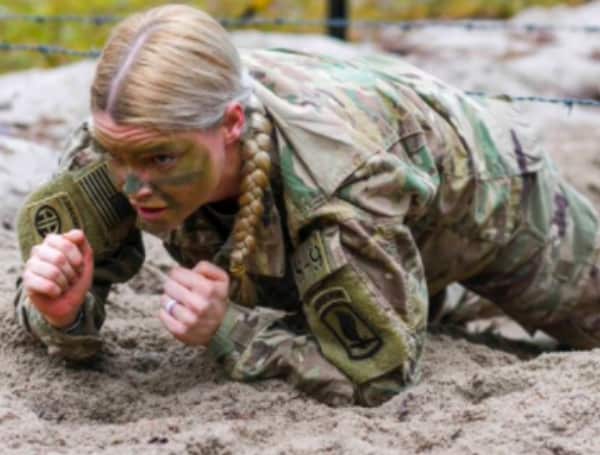This week, the U.S. Army Women’s Foundation celebrated female troops at its annual Hall of Fame/Scholarship awards ceremony.
Retired Brig. Gen. Anne Macdonald, the foundation president, noted that the initiative honors women during Women’s History Month. “Women have been critical members of the Army and have changed the course of history,” Macdonald said, according to the website DCmilitary.com.
“We have learned that the contributions of women make our Army and nation stronger.”
That may be true to a degree, except for one thing. The Army is now admitting that women themselves are not “stronger,” or at least as strong as they should be, and are weakening standards.
As the Associated Press reported on Wednesday, “After three years of complaints and debate, the Army has scrapped its move to have a physical fitness test that is gender- and age-neutral, and will now allow women and older soldiers to pass while meeting some reduced standards.”
The change apparently affects only regular annual fitness tests that all soldiers must pass. The Army still will require all soldiers, regardless of age or sex, to pass the same fitness test if they seek combat roles or elite specialized training, such as Ranger school.
According to the AP, the Army in 2019 apparently tried to adopt new, and more rigorous standards, trading the decades-long fitness test including pushups, situps and a run to a combo of six events: the dead lift, power throw, pushups, plank, run and a combination sprint/drag/carry.
“The new test, however, has been met with widespread criticism as women and older soldiers, including some in senior positions, had difficulty passing it,” the AP reported.
“Troops in the National Guard and Reserve were also struggling and were having a hard time finding and getting equipment needed to train on and practice for the test.”
Yet a study of the new test by the RAND Corp. found that the largest difference in passing rates was between the genders.
The revised fitness test will allow “women and [older] soldiers to do a bit less in some of the events and still pass. As one example, in the dead list women pass by heaving 20 pounds less weight than men. Women and older men also get an additional minute or two to finish the run.
Chaitra Hardison, a RAND behavioral scientist, told the AP little evidence indicated the fitness scores accurately predicted combat job performance or that doing well led to reduced injuries. Instead, the scores better assess a soldier’s general physical fitness.
Which some of us may think is important in war.
Yet now using a tiered scale for passing scores makes the fitness test less “punitive,” especially when handing out promotions.
Ironically, the Army ditched its previous test because too many soldiers were seen as unfit and undeployable.
The AP noted that the Army hired the RAND Corp. to study the new test.
While combat soldiers passed with relative ease, “at the lower end of the scale were women — and men — in far less physical jobs such as food and laundry specialists, various nutrition, health care, and human resources personnel, and chaplains.”
“The study concluded that the fitness test could drive soldiers out of the Army, both because they failed and were discharged or they voluntarily left because low scores led to fewer job opportunities,” the AP reported.
Yet it now seems that physically fit soldiers are no longer a high priority for the U.S. Army.
Rather, it is … wait for it … equity.
Sgt. Maj. of the Army Michael Grinston, one of the Army’s wokest senior leaders, told the AP, apparently without irony, that the revised fitness test will help “maintain the Army’s strong commitment to a positive culture of physical fitness while ensuring fairness.”
Visit Tampafp.com for Politics, Tampa Area Local News, Sports, and National Headlines. Support journalism by clicking here to our GiveSendGo or sign up for our free newsletter by clicking here.
Android Users, Click Here To Download The Free Press App And Never Miss A Story. Follow Us On Facebook Here Or Twitter Here.

